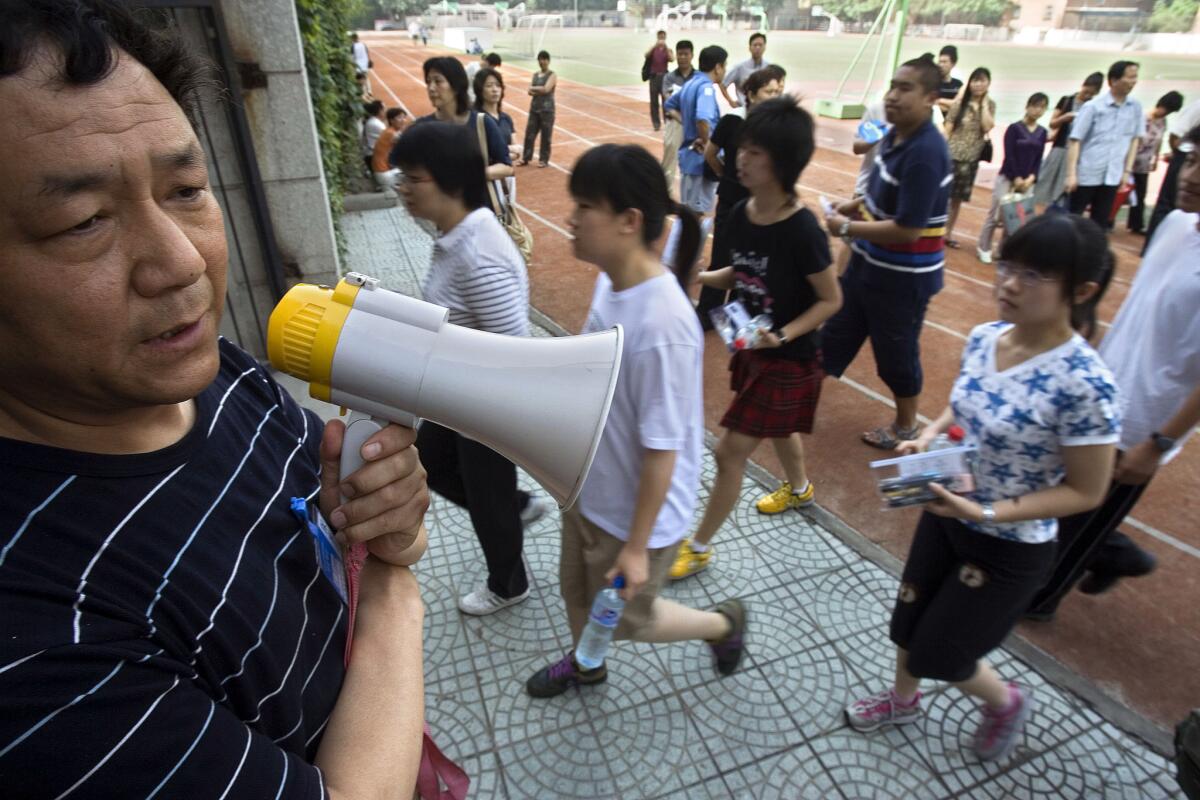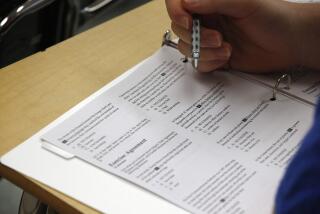China complains SAT may impose American values on its best students

Reporting From Beijing ‚ÄĒ Chinese students have shown an insatiable appetite for attending U.S. colleges ‚ÄĒ last year alone, more than 235,000 were enrolled at American institutions of higher education. But now, some in China are grousing that the SAT may impose American values on its best and brightest, who in preparation for the exam might be studying the Declaration of Independence and the Bill of Rights instead of ‚ÄúThe Selected Works of Mao Tse-tung.‚ÄĚ
‚ÄúIncluding content from America‚Äôs founding documents in a revised U.S. college entry exam has drawn attention in China, with worries the materials may impose the American values system on students,‚ÄĚ China‚Äôs official New China News Agency said last week.
The U.S. College Board in March announced plans to redesign the SAT to include key U.S. historical documents in one portion of the test, known as the Evidence-Based Reading and Writing, by spring 2016.
‚ÄúThe vital issues central to these documents ‚ÄĒ freedom, justice, and human dignity among them ‚ÄĒ have motivated numerous people in the United States and around the globe,‚ÄĚ the College Board said in a statement.
But those are the exact values that the Chinese Communist Party has deemed as threatening to its rule; Chinese activists who have tried to promote such values have been silenced or jailed. Human rights advocate Xu Zhiyong, who initiated the New Citizens Movement to promote such values, was sentenced in January to four years in prison.
The news agency‚Äôs report cited commentary published recently in the South China Morning Post, a Hong Kong newspaper, about the SAT changes. Author Kelly Yang argued that the new focus on civil liberties may ‚Äúchange the mind-set and world view of an entire generation of Chinese youth.‚ÄĚ
‚ÄúIf the new SAT succeeds, it will be the first time America is able to systematically shape the views, beliefs and ideologies of hundreds of thousands of Chinese students every year, not through a popular television show or a politician‚Äôs speaking tour, but through what the Chinese care about most ‚ÄĒ exams,‚ÄĚ she wrote.
Yang’s remarks and the news agency’s report didn’t sit well with some Chinese intellectuals, who called on the government to ease its ideological control on students rather than make accusations against a foreign exam.
‚ÄúI don‚Äôt think they have grounds to question what‚Äôs in the SAT before they cancel all the ‚Äėpolitical classes‚Äô in Chinese schools,‚ÄĚ said Zhang Ming, a political science professor at People‚Äôs University in Beijing.
Inculcating China‚Äôs youth with Communist ideology has always been a key focus of the party, though the task has required greater mental gymnastics in recent years as the nation has adopted a capitalist economic system. Chinese students are required to take ‚Äúthoughts and morals‚ÄĚ lessons in Communist ideology as early as first grade. In China‚Äôs college entrance exams, questions regarding core Communist theories such as Marxism and Maoism are essential to a student‚Äôs success.
Thanks to a booming economy, hundreds of thousands of Chinese families have opted to send their children to study in the United States (and other Western countries) to avoid China’s highly competitive, sometimes grueling, college entrance exams. Others look to a Western education because they regard China’s system as stagnant and uninspiring.
According to figures from the Institute of International Education, the number of Chinese students studying in U.S. universities has grown by 20% annually for more than six years, and in 2010 China overtook India as the country that sends the largest number of foreign students to the U.S. Though the majority are graduate students, more and more Chinese students are enrolled in undergraduate programs, and some mainland students are now even seeking out high school educations stateside.
To improve their chances of being admitted to undergraduate programs at prestigious American universities, many Chinese high school students take the SAT, even though government policy prohibits it from being administered to students in mainland China. Many travel to Hong Kong to take it.
Boreas Liu, who is going to be a high school senior in Beijing this fall, said the SAT is regarded as crucial by many Chinese students.
‚ÄúMany of my classmates started to prepare for the SAT from the first year of high school,‚ÄĚ Liu said.
Liu, 18, hopes to study classical literature at a top American university. ‚ÄúFrom my first year in high school, I started to read more about American history on my own,‚ÄĚ Liu said. Although he will take the SAT before the test changes in 2016, Liu thinks his knowledge of American history could give him a competitive edge.
‚ÄúLearning those values can help me become a true world citizen,‚ÄĚ Liu said. ‚ÄúI chose to go to the U.S. for my studies, not Britain or Canada, where they don‚Äôt require you to take the SAT.‚ÄĚ
Approved test centers based in Hong Kong became the top option for many Chinese students willing to take the test. Last year, the AsiaWorld-Expo center in Hong Kong hosted more than 50,000 students, more than 90% from the mainland, its chief executive, Allen Ha, told the Wall Street Journal.
According to the Hong Kong newspaper Wen Wei Po, it cost on average $516 for a student from mainland China to take the SAT, including travel expenses and accommodations. Test preparation services for the SAT have seen substantial growth in China, where students are being charged as much as $1,000 for the lessons.
Despite the SAT’s growing popularity, the number of Chinese high school students who choose to take the test is a small fraction of the number taking China’s college entrance exam each year. A total of 9.39 million students took the Chinese test in 2014, according to the Ministry of Education.
Among them are the sons and daughters of some of China’s Communist Party elite.
Instead of pointing fingers at the redesigned SAT, China’s government should look for an answer domestically, the political scientist from People’s University suggested.
‚ÄúWhy is Chinese higher education losing its appeal to our students? Does anyone in China still believe in the Communist ideology?‚ÄĚ Zhang said. ‚ÄúIt looks like the only thing everyone cares about today is money.‚ÄĚ
Tommy Yang in the Times’ Beijing bureau contributed to this report.
More to Read
Sign up for Essential California
The most important California stories and recommendations in your inbox every morning.
You may occasionally receive promotional content from the Los Angeles Times.










